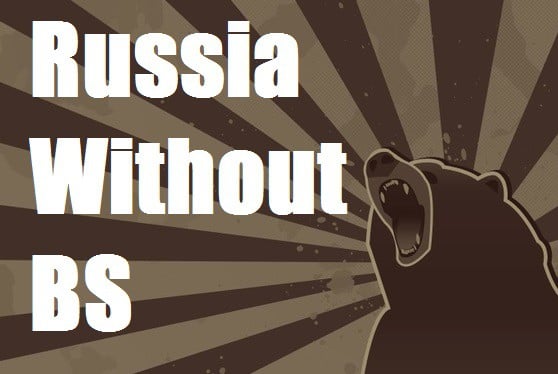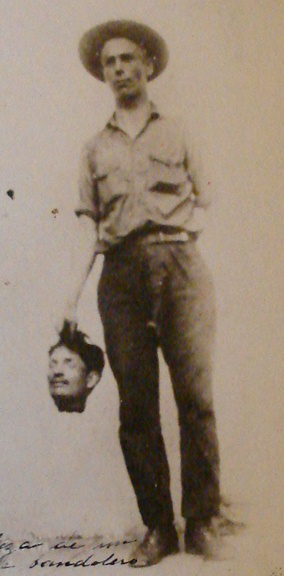
Besides oil an gas, other major exports for the Kremlin include whataboutism and other logical fallacies. This story, however, concerns domestic consumption of whataboutism. Meduza reports on a recent photo exhibition* by the pro-Kremlin group “Network,” entitled “Where a Lie Leads.” The theme “exposes” the lies and crimes of the US government, featuring 11 cases in the past 100 years. Yes, because in Russia it’s courageous to make exhibits about the wrongdoing of some other country but never your own government, no matter how many times it changed in the past century.
The first thing that struck me was the handful of examples. William Blum documented dozens of examples in his book Killing Hope: US Military and CIA Interventions Since WWII. Or perhaps you’re more into the misdeeds of “Perfidious Albion?” Well then there’s The Blood Never Dried: A People’s History of the British Empire by John Newsinger. Not scathing enough? Why not look up Mike Davis’ Late Victorian Holocausts, or if you prefer to focus on American history, there’s always James Loewen’s Lies my Teacher Told Me. Want to know about the lies and delusions that got America into Vietnam? Try Neil Sheehan’s A Bright Shining Lie. Hell, although it isn’t really political and doesn’t point a finger at just one country, probably one of the most eye-opening book I’ve read in my adult life is The Road to Hell by Michael Maren. It will forever change your perspective on the topic of foreign aid.
Whatever you do, don’t rely on the Russian media or their ideologues to educate you on any of these subjects, because they are totally incompetent in both the history and the execution. “Where a Lie Leads” is a perfect example of how little effort these people put into their work. Let us count the ways.
The article begins with an exhibit on the American intervention in Russia during the civil war. According to the report, the exhibit ignores all the other intervention armies from other countries such as Japan, Great Britain, and France. It also deliberately misconstrues some quotes to make it seem like American troops were committing atrocities in Russia.
What the article unfortunately fails to point out is why American troops, along with the other intervention armies, were there in the first place. The intervention was an attempt to prop up the provisional government that had been displaced by the Bolshevik revolution. Apart from the fear of Communism, the Entente powers were most concerned about the Bolsheviks knocking Russia out of WWI. Therefore intervention on the side of the Whites to restore the provisional government was largely geared towards getting Russia back in the war…because they were allies. Yes, remember that? The United States and Russia were allies, going back much further than Russia’s alliance with Great Britain. Russia sold Alaska to the United States to keep it out of British hands. The Russian navy also patrolled the coasts of the US during its civil war, with standing orders to attack British or French ships and assist in the Union blockade of the South should either of those countries extend recognition to the Confederate States.
And what right do these people have to complain about Americans coming over to fight some Bolsheviks? After all, the Dear Leader Putin himself recently condemned Lenin for destroying the precious Russian empire, where each and every illiterate communal peasant, no matter how poor and no matter how many children lost before the age of five, could beam with pride at the idea that “they” exercise authority over Poles or Finns, and of course Ukrainians were forbidden to print literature in their own language. Then again, I’m quite confident that every vatnik who dreams of this golden age is quite certain that if he were alive then, he wouldn’t be an illiterate peasant like most of the population back then. No, he’d be some cossack officer, possibly related to the nobility, and his life would resemble a Tolstoy novel in the early 20th century.
Whatever the case, many years ago I heard teenagers tell me how they’d been taught that the Russian empire was on its way to become like the United States in terms of economic development, until WWI and Lenin came along and ruined all that. Patriarch Kirill had commented on this same alternative history theme at least once, to the best of my memory. So these people really ought to be cheering the Americans for trying to save their country from an ignominious defeat, right? Whatever the case, I doubt the exhibit even mentions the reason why the US, along with Britain and France, ultimately pulled troops out of Russia along with their support for the Whites. This was due to mass strikes and protests by American, British, and French Communists in their home countries. In the US there was a general strike where the workers refused to load or service ships sending troops or arms to Russia. You’re welcome.
The worst failures of the exhibit come from the photos themselves. A photo (graphic) that was supposed to be from the American intervention in Nicaragua in the 1920’s was actually from the Rwandan genocide in 1990’s. Let that sink in- they didn’t accidentally use a photo showing an atrocity committed by US-backed Contras in the 80’s. It’s not that they got a photo from the wrong country. They got a photo showing an atrocity committed in another country, on another continent, in a war the US had nothing to do with. How does one fuck up that badly? Please somebody answer that question for me! You want a grisly photo of an atrocity carried out in the 1920’s intervention in Nicaragua? Here you go:

Not only is that photo more accurate, you know, being from the same continent and all, but it’s also way more graphic. And if you’re wondering where I found out about this photo, I first saw it in a book I purchased from a large chain bookstore in 2004. It’s called Addicted to War, and you can actually look through the 2004 edition here. One page even mentions the US intervention in Russia. Like the books I mentioned above, one may dispute certain claims or interpretations of historical fact in Addicted to War, but once again I must drive home the point that the Western media and Western sources do a far better job exposing the crimes of their own governments than Russian media does. In fact, the latter often has to rely on Western sources when they report on these things, no doubt in large part because they can’t be bothered to do any actual research.
Ah but it gets even better, folks. Remember this iconic photo from the Bosnian War?

The photo depicts members of the infamous paramilitary unit known as Arkan’s Tigers (officially: Serb Volunteer Guard) kicking Bosnian Muslim civilians in Bijeljina. For some unknown reason this photo was used in a section about the NATO bombing of Yugoslavia in 1999, which of course was related to the war in Kosovo, not Bosnia. Just imagine for a second that this photo was used in a NATO exhibit to justify the 1999 bombing campaign. Assuming someone actually gave enough of a shit to check, you can bet some pro-Kremlin blogger or columnist would have been howling mad over this lying propaganda. And hey, justifiably so, but when it comes to NATO propaganda, they tend to have much higher standards than the Kremlin media. And if they hadn’t bungled Kosovo enough, they actually posted a photo of an Albanian woman whose home had been destroyed by Serbian forces, not NATO. Again, how hard is it to find something like this? There’s no Russian language version of the page, but there are Serbian and Ukrainian versions. What’s the matter? Can’t understand any of the language of your “Slavic brothers,” vatniks?
In the end I think it’s important to realize several key points here. First of all, the best sources on the crimes of Western governments are almost invariably going to come from Western sources. One reason why this is the case is because in democratic societies, there’s this idea that individuals aren’t representatives of their government. If anything they are supposed to be a check on state power.Even many of the people who write for Russian media at least claim to be doing so due to a disagreement with their respective governments’ policies.
Likewise, however naive it might seem, the basic idea of journalism is that a free press is also a check on power, and its job is to question authorities. By contrast the Kremlin media chiefs and “political technologists” just arbitrarily decide that they’re in an “information war,” and this justifies not caring about credibility or verifying sources, and in some cases, fabricating stories out of thin air. Yes, thank you, we all know that the mainstream media has in the past failed to properly cover certain stories, with dire consequences. And yes, they will probably do it again in the future. But just because a system is flawed due to the contradictions between the ideal of journalism and the reality of a capitalist, profit-driven system doesn’t mean we should reject it entirely in favor of propaganda outlets that deliberately distort stories or fabricate entirely.
This case also demonstrates how fears of Russia “weaponizing information” are largely overblown assuming you’re not in Ukraine, Georgia, or some Baltic state. The fact is that no matter how many times they embarrass themselves, these propagandists seem to have a compulsion to do everything half-assed. Hell, it’s more like quarter-assed or even tenth-assed. Yes, they are on an all-out offensive, but from what I’ve seen recently China has Russia beat in terms of propaganda, even right down to the whole “troll army” concept. And perhaps the reason why some American leaders are panicking about Russian information warfare is because they’ve largely been giving China a free pass on all kinds of heinous behavior over the past few decades.
Ultimately this “information war” is doomed to fail (indeed I’ve argued that it already has) for several key reasons. One is because they don’t care about credibility. They think there’s some kind of inherent value in confusing the enemy with disinformation, something they did for decades during the Cold War. That might sound pretty serious were it not for one inconvenient detail- they lost the Cold War. Second, the system is largely based on sucking up to superiors and showing what a great team player you are. There’s little to no room for dissent. If there were, we’d probably see much more varied propaganda coming from the Russian side, and some of it might actually have some quality. I estimate that we don’t see that because internal criticism is either ignored, dismissed, or maybe even subtly punished. Anyone claiming that RT would achieve far more if it were more objective and paid more attention to accuracy and sources probably won’t be taken seriously. The demise of The Moscow News and the RIA-Novosti English service teaches us about how much objectivity and diversity of opinion is respected in Kremlin media.
The last point is a minor one, but when I look at something like this story all I can think is how cowardly these people are. Here they are, in Moscow, no doubt with some form of funding or support from the state, showing their bravery and principles by condemning the United States. This would make sense in a country that is allied with the US, especially if it were participating in some US military operation at the time. But in that country and in the US itself, it is generally accepted that courage lies in standing up to one’s own government when it is wrong. We tend to admire journalists who expose wrongdoing and whistle-blowers, not government spokespeople or lobbyists. And when it comes to Western correspondents who criticize Russia, I don’t know a single one that sticks up for human rights violations in Ukraine, in the US, Saudi Arabia, or whatever. Principle is what matters.
Just a closing thought on that last note- I might have mentioned this anecdote before, but I was 17 I once wrote a final project in high school called “American War Crimes” (complete with a “political cartoon” for the cover that I made in MSPAINT) for my international relations class. It was after I’d been to Russia the first time, discovered Chomsky, and was fully into that ultra-edgy phase that every white American male seems to hit and hopefully, grows out of later down the road.** I saw some kind of inherent value in going against “the establishment,” and I knew enough to anticipate that it would be controversial, so I devoted a lot of time on the then-slow and crappy internet (search engine of choice: Alta Vista) trying to find the best sources I could. In the end the paper got a B, from a teacher who used to work for the US Department of State no less. It was certainly no worse than this exhibition. And if I could somehow find a copy of that paper after nearly twenty years…I could probably get it published in Russia Insider.
*Unrelated note: I don’t usually give dating advice but I remember that on many occasions Russian women would invite me to some photo exhibition for a date. Never accept such an invitation. These are all incredibly boring and you’ll either be saying “This one’s nice,” 40 times, or you’ll end up trying to sound like you actually know something about photography, e.g. “I like how the lighting in the foreground contrasts sharply with the shadow in the background, creating a subtle interplay of color. He certainly used the right lens for this shot!” Further romantic activities are highly unlikely to take place afterwards, unless your date has a fetish for men trying to hide how bored they are.
**Yes, I was listening to Rage Against the Machine all the time too.





